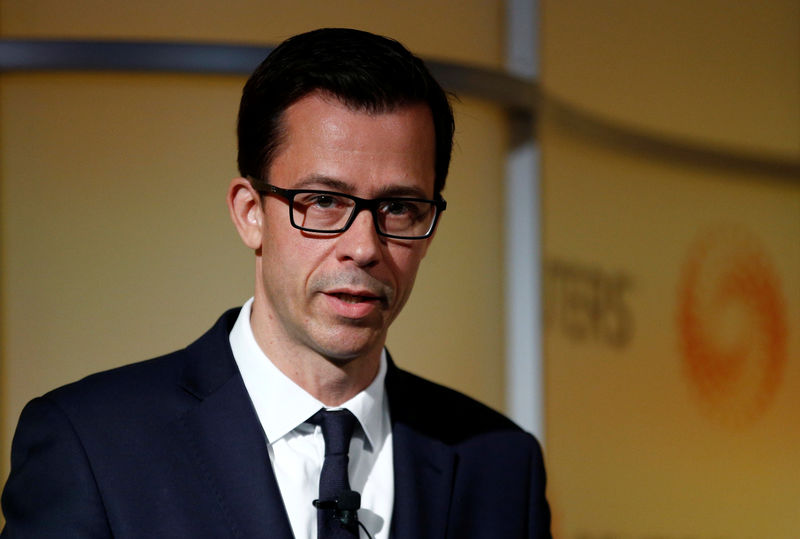By William Schomberg
LONDON (Reuters) - The Bank of England should follow the lead of other central banks and say explicitly what it thinks it will do to interest rates in order to make itself more transparent, according to one of the British central bank's top officials.
Gertjan Vlieghe said the BoE's current approach posed "a complex reverse-engineering problem" for anyone trying to understand its views on rates, and Brexit had "amplified some of the difficulties we always face in communicating effectively".
Around a quarter of the British public have no idea where rates are heading, the biggest share since records started 20 years ago, according to the BoE's own survey of households.
"If we want people to understand what we, the Monetary Policy Committee, think is the necessary path of interest rates to achieve the inflation target, why not just tell them?" Vlieghe said in a speech at Thomson Reuters in London.
Since 2004, the BoE has calculated its growth and inflation projections based on the expectations of investors for how borrowing costs will change, not forecasts of its own.
BoE watchers typically work out the pace at which rates will rise or fall by seeing how far inflation is forecast to be above or below the BoE's target after two or three years.
Aside from complexity, this approach can pose a problem if the BoE and investors disagree on basic assumptions -- such as the stark disconnect now over the likely outcome of Brexit.
The BoE has stuck to the message that it first sent out in 2014 -- borrowing costs are likely to rise at "a gradual pace and to a limited extent".
That stance now includes the assumption that Britain will avoid the economic shock of no-deal Brexit.
But a no-deal Brexit is seen by markets as a growing risk because both candidates to be Britain's next prime minister have said they are prepared to leave the EU without a deal.
Many investors are pricing in lower rates, not higher ones.
Recognizing the disconnect, BoE Governor Mark Carney has said a no-deal Brexit is likely to lead to rate cuts. He has also said the BoE will "explore how to best illustrate these sensitivities" in its next round of forecasts due on Aug. 1.
FROM RATES MYSTERY TO FORWARD GUIDANCE
Central banks have come a long way in terms of making themselves more transparent which they now see as key to their effectiveness in an era of super-low interest rates.
The U.S. Federal Reserve only began to announce how much it had changed rates in 1994. The BoE was liable to change rates at any time until it began regularly scheduled monetary policy meetings in 1992.
After the global financial crisis, many central banks sought to ramp up the stimulus effect of near-zero interest rates by giving a clear steer on how long they were likely to remain low.
Although "forward guidance" sometimes failed to keep pace with sudden changes in the post-crisis economy, it was widely seen as a helpful addition to the arsenal of central banks.
In his speech on Friday, Vlieghe -- who previously worked at the BoE and for a hedge fund -- sought to lead by example with his transparency call by giving his own BoE rate forecasts.
If Britain can ease its way out of the EU with a deal, it could raise Bank Rate -- currently 0.75% -- to 1.0% in one year, 1.25% in two years and 1.75% in three years' time, he said.
On the other hand, the BoE might need to cut Bank Rate to a fraction above zero after a no-deal Brexit while repeated Brexit delays could also make a rate cut necessary.
Vlieghe, an external member of the nine-member MPC, will face a challenge to win over persuade his colleagues, even if the BoE will have a new governor from February next year who could bring new ideas.
Deputy BoE Governor Dave Ramsden said last year he was worried that interest rate forecasts would be misunderstood as promises to move borrowing costs and the central bank's credibility could be damaged if they did not come about.
Vlieghe said none of the central banks which publish rate projections -- including those in New Zealand, Norway, Sweden, Israel, South Africa, Czech Republic and the United States -- had found them to be mistaken for promises.
Instead, a clear set of forecasts would bring about "a modest improvement" in how businesses, households and financial markets understand the BoE's objectives.

"This global communications trend is consistent with the evolving consensus that it is important for a central bank to be as transparent as possible," he said.